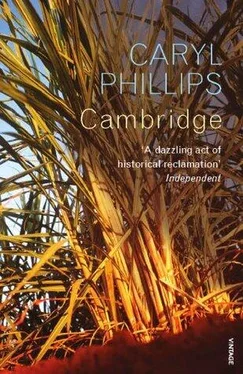Caryl Phillips - Cambridge
Здесь есть возможность читать онлайн «Caryl Phillips - Cambridge» весь текст электронной книги совершенно бесплатно (целиком полную версию без сокращений). В некоторых случаях можно слушать аудио, скачать через торрент в формате fb2 и присутствует краткое содержание. Год выпуска: 2009, Издательство: Vintage Digital, Жанр: Современная проза, на английском языке. Описание произведения, (предисловие) а так же отзывы посетителей доступны на портале библиотеки ЛибКат.
- Название:Cambridge
- Автор:
- Издательство:Vintage Digital
- Жанр:
- Год:2009
- ISBN:нет данных
- Рейтинг книги:5 / 5. Голосов: 1
-
Избранное:Добавить в избранное
- Отзывы:
-
Ваша оценка:
- 100
- 1
- 2
- 3
- 4
- 5
Cambridge: краткое содержание, описание и аннотация
Предлагаем к чтению аннотацию, описание, краткое содержание или предисловие (зависит от того, что написал сам автор книги «Cambridge»). Если вы не нашли необходимую информацию о книге — напишите в комментариях, мы постараемся отыскать её.
Cambridge — читать онлайн бесплатно полную книгу (весь текст) целиком
Ниже представлен текст книги, разбитый по страницам. Система сохранения места последней прочитанной страницы, позволяет с удобством читать онлайн бесплатно книгу «Cambridge», без необходимости каждый раз заново искать на чём Вы остановились. Поставьте закладку, и сможете в любой момент перейти на страницу, на которой закончили чтение.
Интервал:
Закладка:
Owing to a slight misfortune to the heel of my right shoe, Mr Brown and I had reason briefly to present ourselves at the hovel of one of these free negro dandies, having learned that these days no white cobbler was keeping shop-hours in the capital. This black, himself unshod, was busily employed in fashioning, from the most unfragrant materials, a pair of high boots, no doubt destined for the legs of some black exquisite. As he did so he sang a tune in a minor key which Mr Brown identified as negro music, but which to my ear seemed a corrupt version of an old Welsh air, the name of which I could not recollect. On observing us the black rolled up his eyes until only the whites were visible, and then, holding his little flannel cap in one hand, he prostrated himself before us in a gesture of base supplication. Upon this performance I beat a hasty retreat, determined if need be to hobble all day. Most of the sooty tribe have embraced dully a belief in their own degradation and inferiority, and clearly this is the greatest impediment to their making progress, for self-love can never be as towering a sin as wilful self-neglect. This desperate tendency to despise their own race and colour is one of the ugliest consequences of their miserable condition. However, truly I was unsure, in the case of this sambo, whether or not he was making sport of us, for I detected about his free person touches of wit which he appeared to be only partly concealing, but to what purpose I could not fathom. Mr Brown declined to comment.
While the ever-present question of negro civility was pressing upon my mind, Arnold suggested that I might wish to witness the proceedings of a slave-court that was currently in session. As I entered, the delightful cool air of the Court-House struck me sweetly about the brow and banished the heat-induced throbbing which was beginning to assault my person. The interior of this Court-House was fitted up in an elaborate style, and boasted a display of blue paint, intended, one presumes, to give it a commanding yet informal appearance, especially in the warm light of day. To mine own eyes the decor merely conveyed a lamentably shoddy impression more reminiscent of gaudy public Reading-Rooms, or the imagined labyrinths of a Gentleman's place of entertainment. The atmosphere of sobriety that one might properly associate with a place of legal judgement appeared to have played no part in the design of this creole palace.
The case before us involved a seventeen-year-old girl, of most disgustingly dirty appearance, originating from the plantation below our own. Her name was Punch, a peculiar appellation which I assumed to be a fond name. Arnold seemed to have some understanding of the details of her case. It appears that she attempted to infuse some corrosive sublimate into the sangaree of her master, with the intention of dispatching him to another world. The master, having received warning that such treachery might be abroad, pretended to drink the lethal potion and men observed her reaction by the minute as he went unscathed about his daily duties. Eventually Punch broke down screaming, sure that either a miracle had taken place or her master had by stealth become jumby. The trial appeared to be conducted with reasonable propriety and justice. The jury consisted of three respectable local citizens, the bench of a magistrate presided over by a senior member, who appeared a most pompous coxcomb, no doubt standing mighty high in his own estimation.
In this case of Punch the poisoner there was no legal representation on either side, which circumvented the often laborious and time-wasting process of quiz and counter-quiz, and artful cross-examination punctuated by theatrical appeals to the passions. It is to be greatly lamented that the dangerous practice of perjury is commonplace among negroes. Arnold informed me that some have argued that the condition of ignorance to which the negro is deliberately reduced necessarily renders him unable fully to comprehend the serious obligations of an oath, but history apparently proves this claim false. The negro, whether house-slave or field, bond or free, is likely to fabricate a tale wherein every second sentence will contradict what has gone before. This accumulation of falsehoods is always compounded by his declaring a passionate desire to 'kiss the book', and reinforced with wild assertions of the purest innocence. Mercifully, this Punch appeared to have no defence and was summarily condemned to the, in two days time, by hanging. There was no appeal, and sentence was passed without the least emotion on the part of the magistrates, although tears of pity were apparent enough upon the countenances of the sombre mass of black life that filled the public gallery, plainly aggrieved that the word of the worst scoundrel, were he the possessor of a white skin, would be given preference to their own testament. I asked Arnold whether any white person had been condemned to the for a crime such as killing a slave, but he made reply that were a black to be killed by a cruelly disposed master, in law such cases are considered trifles, for there is usually no reason for a man to deplete his stock without good and just cause. I did not think this is a shining example of rational argument to submit to those in whom one is trying to instill the rudiments of our morality, although Mr Rogers would no doubt vigorously contest the wisdom of making any effort to lead our black brethren and sisters out of their moral darkness. A formal system of law whereby any offender, irrespective of colour or quality, is meted out just punishment, seems not to have taken hold on this island.
At the end of this somewhat afflicting trial, Arnold and I decided not to wait until another negro's fate was sealed. We boarded our carriage and proceeded to the north-east, out of the capital, then turned inland and towards the cooler dime of the hills that nestled in the lee of the mountain. Our interior journey took us along a thin, wearisome track that was truly almost concealed by returning nature. At intervals our path was totally overgrown with tall grass, and in other places made dangerous by the deep ruts created by the seasonal journeys of the sugar carts. Such perils demanded the most skilful handling of our carriage. As we made our laborious progress, our eyes were assailed by an unpleasant sight. We happened upon a small cluster of houses, which, although they did not constitute a village, had a communal aspect about them. These rural dwellings were in general of mean construction, although some few were erected in neatly stacked native stone. One vainglorious hovel sported a well-stocked garden of negro produce, such as eddoe, yam, arrowroot, etc., but even this mansion stood destitute of paint. I was startled and horrified to observe that the denizens of this hamlet were white people who had evidently declined financially and morally, having witnessed the estates they worked on sold to meet mortgage debts. Many had arrived in these parts as indentured servants, their period of servitude understood to be seven years, at the conclusion of which their master was to reward them with fifty shillings, four hundred pounds of sugar or tobacco, and a certificate of their manumission. Unable to marry a free person without the consent of their master, the fine for such an illicit connection being — absurdly in view of their extreme poverty — one hundred guineas, they existed in a pitiable state of bondage, and were as likely to be subject to a public whipping or imprisonment as the common negro.
Naturally these poor white Creoles form an entirely different class from those whites who have emigrated in search of financial gain, or whose government or domestic duties have torn them, albeit temporarily, from the bosom of the land of their birth. Although outnumbered by their superiors, mere are not a few of these pale-fleshed niggers enduring these lamentable conditions. But not all of these poor-whites came to the island as poverty-stricken indentured servants. Some had suffered from ill-fortune or improvidence, and fallen from the comparative wealth of slave ownership and a position of some standing in the white community, to the depths of poverty and depredation. According to Arnold the most destitute among them now rely upon the kindly benevolence of negroes. These black Samaritans feel pity for the white unfortunates and take a mess of stewed produce, with a proportion of garden-stuff from their own grounds made savoury by a little salt meat, to their old misses and massa. A few hundred yards beyond this wretched compound I was able to witness the truth of Arnold's claim that the negro sometimes displays a wondrous constancy to these old white attachments. We stopped an old leathery woman, her face lined with a thousand wrinkles, who sucked on what must once have been designated a pipe. Time had bent her form and grizzled her woolly hair, yet her black eyes were never still. Upon her head she carried a basket, and protruding beneath her billowing skirt a monstrous pair of elephant legs completed the picture. As though foreseeing our concern, she entered unbidden into conversation with an aphorism: 'What on the head we no feel, but what on a hand hurt da shoulder.' Arnold smiled and then quizzed her about her destination. She pointed to the basket and spoke emphatically, as though anxious to impress upon us her status. 'I'm carry dem provisions to my old misses for she be very kind to me when I be her nigger; my mistress knowed better times, but bad times now misses, bad times — my misses had plenty nigger, and her husband, and fine pick-a-ninnies, but dem bad times come. Den massa the and misses sell nigger, one, two, three — all gone. Now bad times and so we just go now and den and see misses, and gie her some yam, or some plantain, or any little ting just to help her.' With this the dark benefactress smiled and pressed on with her mission of mercy, with the knowledge that starvation always conquers pride, and that even a dish of negro pottage can be a banquet to the impoverished whites.
Читать дальшеИнтервал:
Закладка:
Похожие книги на «Cambridge»
Представляем Вашему вниманию похожие книги на «Cambridge» списком для выбора. Мы отобрали схожую по названию и смыслу литературу в надежде предоставить читателям больше вариантов отыскать новые, интересные, ещё непрочитанные произведения.
Обсуждение, отзывы о книге «Cambridge» и просто собственные мнения читателей. Оставьте ваши комментарии, напишите, что Вы думаете о произведении, его смысле или главных героях. Укажите что конкретно понравилось, а что нет, и почему Вы так считаете.












